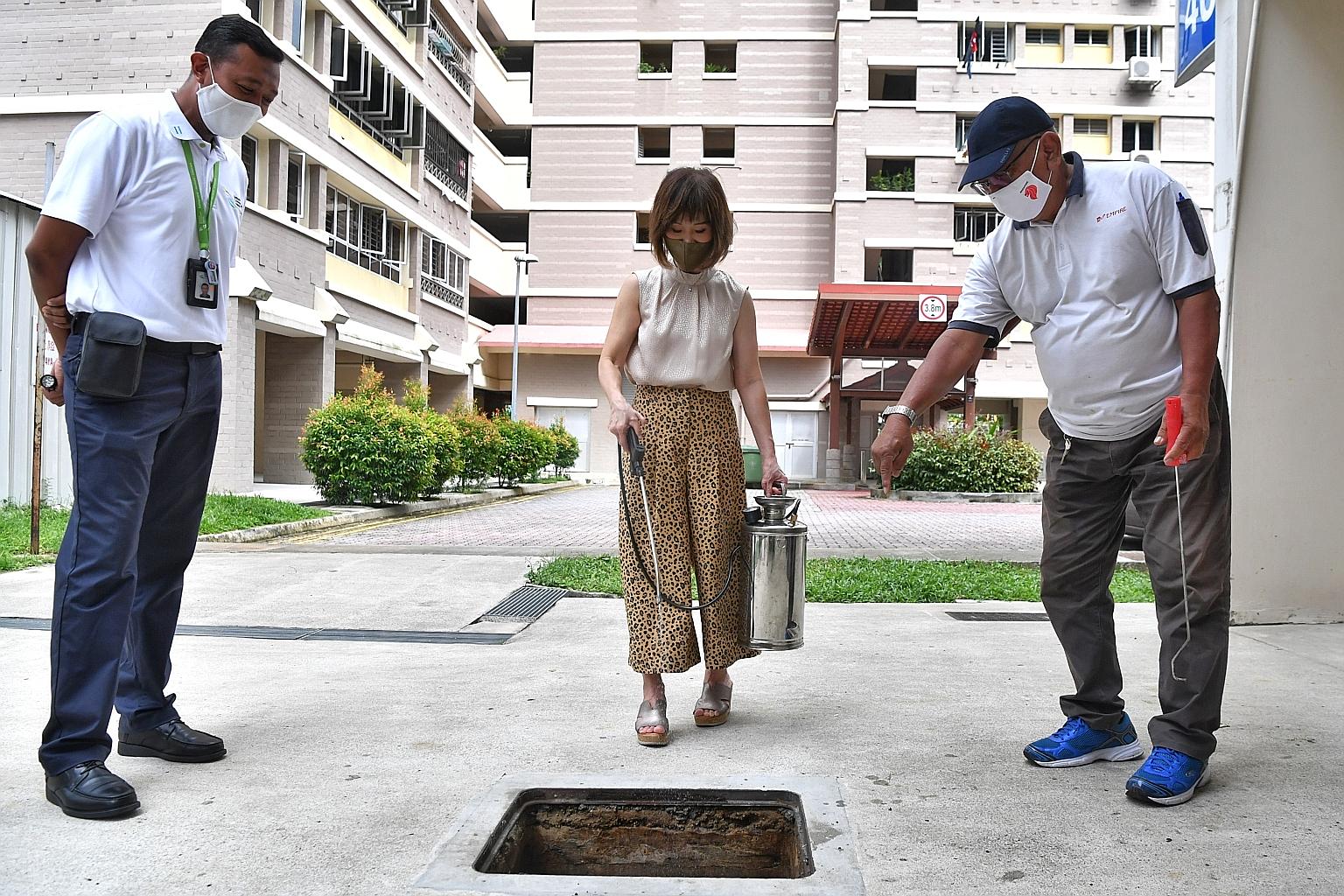Intensive vector control exercise to combat dengue
In Jan-June this year, NEA detected 50% more Aedes mozzies in town council-managed areas
Sign up now: Get ST's newsletters delivered to your inbox

Senior Minister of State for the Environment and Water Resources Amy Khor trying her hand at oiling the drains at Block 408 Bukit Batok West Avenue 4 yesterday.
ST PHOTO: CHONG JUN LIANG
To combat the unprecedented dengue outbreak this year, the National Environment Agency (NEA) will be working with town councils on a two-week intensive islandwide vector control exercise, the agency announced yesterday.
Inspections and vector control operations in town council-managed common areas will be stepped up to ensure drains are well-maintained, areas are kept litter-free, and stagnant water is removed or treated.
NEA said Housing Board estates account for 45 per cent of active dengue clusters.
The exercise will also include chemical treatment - such as fogging, misting and larviciding - in dengue clusters to shrink the adult mosquito population.
From January to June this year, NEA detected 50 per cent more Aedes mosquitoes in town council-managed areas compared with the same period last year. There was also a 30 per cent increase in the mosquito numbers detected from May to June this year - coinciding with the circuit breaker period - compared with February and March.
The reduction of landscaping work and cessation of most construction activities, which hampered good housekeeping in construction sites during the circuit breaker, were some factors that worsened the dengue situation, said NEA.
MP for Mountbatten Lim Biow Chuan said some key measures his constituency will undertake over the next fortnight include desilting and cleaning drains, and oiling gully traps and drains containing stagnant water that cannot be removed.
"We carried out fogging with NEA at Dakota Crescent and Balam Road estate" this week, said Mr Lim. "Next week, it will be done at Chai Chee and progressively to other clusters."
Dakota Crescent, Balam Road and Chai Chee are dengue red zones.
There have been close to 20,000 dengue cases this year, with a record 1,733 cases reported last week, the highest number of weekly dengue cases recorded in Singapore.
The total number of cases this year is expected to exceed the 22,170 reported in 2013, the highest in history, said NEA. Nineteen people have died of dengue so far this year.
Calling the extent of the dengue outbreak this year "very worrying", Senior Minister of State for the Environment and Water Resources Amy Khor emphasised the need for collective and urgent community efforts to prevent the situation from worsening.
Dr Khor was speaking to the media on the sidelines of vector control operations in Bukit Batok West Avenue 4 yesterday.
The idea of the intensive islandwide exercise is to "reduce the mosquito population and break the chain of dengue transmission so that we can flatten the curve, as it was to prevent the number of dengue cases from escalating again", she said.
As of Thursday, there were 424 active dengue clusters, with five large ones. The largest cluster in the Aljunied-Geylang area has 276 cases. The Bukit Panjang Ring Road cluster is the second largest, with 272 cases.
Some clusters, including the ones at Aljunied Road-Geylang Road and the 258-case cluster at the Arthur Road area have faster rates of disease transmission, with an average of two or three cases reported daily over the past two weeks.
Five clusters, including those at Woodleigh Close, Bidadari Park Drive/Woodleigh Link and Alkaff Crescent, are now closed.
During the two-week exercise, NEA will work closely with grassroots advisers and volunteers to advise more residents to get rid of mosquito-breeding habitats at home.
As most people are working from home, Dr Khor also reminded residents living in dengue-cluster areas to spray insecticide in the dark corners of their homes, apply mosquito repellent every three hours, and wear long sleeves and pants as much as possible.


